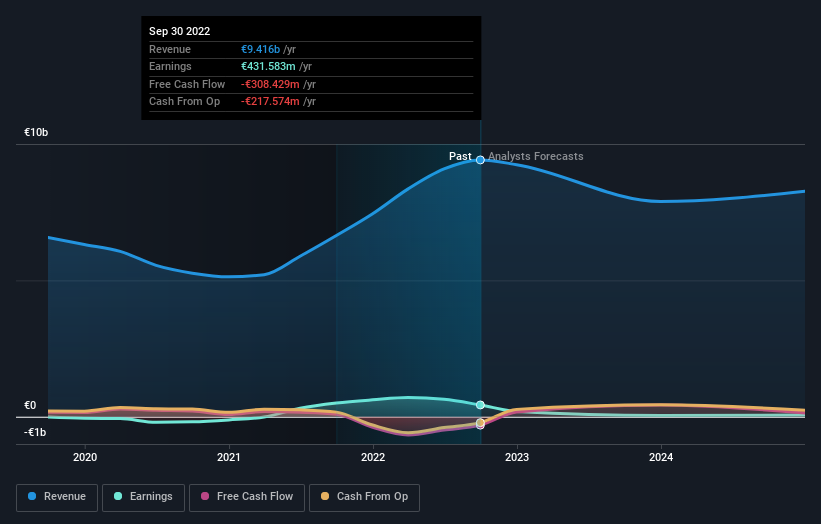Klöckner & Co SE's (ETR:KCO) top owners are individual investors with 46% stake, while25% is held by institutions
A look at the shareholders of Klöckner & Co SE (ETR:KCO) can tell us which group is most powerful. With 46% stake, individual investors possess the maximum shares in the company. In other words, the group stands to gain the most (or lose the most) from their investment into the company.
Meanwhile, institutions make up 25% of the company’s shareholders. Institutions will often hold stock in bigger companies, and we expect to see insiders owning a noticeable percentage of the smaller ones.
Let's take a closer look to see what the different types of shareholders can tell us about Klöckner & Co.
See our latest analysis for Klöckner & Co
What Does The Institutional Ownership Tell Us About Klöckner & Co?
Institutions typically measure themselves against a benchmark when reporting to their own investors, so they often become more enthusiastic about a stock once it's included in a major index. We would expect most companies to have some institutions on the register, especially if they are growing.
We can see that Klöckner & Co does have institutional investors; and they hold a good portion of the company's stock. This can indicate that the company has a certain degree of credibility in the investment community. However, it is best to be wary of relying on the supposed validation that comes with institutional investors. They too, get it wrong sometimes. It is not uncommon to see a big share price drop if two large institutional investors try to sell out of a stock at the same time. So it is worth checking the past earnings trajectory of Klöckner & Co, (below). Of course, keep in mind that there are other factors to consider, too.
Klöckner & Co is not owned by hedge funds. SWOCTEM GmbH is currently the largest shareholder, with 25% of shares outstanding. Franklin Resources, Inc. is the second largest shareholder owning 5.7% of common stock, and Claas Daun holds about 3.1% of the company stock.
Looking at the shareholder registry, we can see that 50% of the ownership is controlled by the top 12 shareholders, meaning that no single shareholder has a majority interest in the ownership.
While it makes sense to study institutional ownership data for a company, it also makes sense to study analyst sentiments to know which way the wind is blowing. Quite a few analysts cover the stock, so you could look into forecast growth quite easily.
Insider Ownership Of Klöckner & Co
While the precise definition of an insider can be subjective, almost everyone considers board members to be insiders. Management ultimately answers to the board. However, it is not uncommon for managers to be executive board members, especially if they are a founder or the CEO.
I generally consider insider ownership to be a good thing. However, on some occasions it makes it more difficult for other shareholders to hold the board accountable for decisions.
We can report that insiders do own shares in Klöckner & Co SE. In their own names, insiders own €28m worth of stock in the €929m company. This shows at least some alignment. You can click here to see if those insiders have been buying or selling.
General Public Ownership
The general public-- including retail investors -- own 46% stake in the company, and hence can't easily be ignored. While this size of ownership may not be enough to sway a policy decision in their favour, they can still make a collective impact on company policies.
Private Company Ownership
It seems that Private Companies own 25%, of the Klöckner & Co stock. It might be worth looking deeper into this. If related parties, such as insiders, have an interest in one of these private companies, that should be disclosed in the annual report. Private companies may also have a strategic interest in the company.
Next Steps:
I find it very interesting to look at who exactly owns a company. But to truly gain insight, we need to consider other information, too. Case in point: We've spotted 4 warning signs for Klöckner & Co you should be aware of, and 2 of them are potentially serious.
If you would prefer discover what analysts are predicting in terms of future growth, do not miss this free report on analyst forecasts.
NB: Figures in this article are calculated using data from the last twelve months, which refer to the 12-month period ending on the last date of the month the financial statement is dated. This may not be consistent with full year annual report figures.
Have feedback on this article? Concerned about the content? Get in touch with us directly. Alternatively, email editorial-team (at) simplywallst.com.
This article by Simply Wall St is general in nature. We provide commentary based on historical data and analyst forecasts only using an unbiased methodology and our articles are not intended to be financial advice. It does not constitute a recommendation to buy or sell any stock, and does not take account of your objectives, or your financial situation. We aim to bring you long-term focused analysis driven by fundamental data. Note that our analysis may not factor in the latest price-sensitive company announcements or qualitative material. Simply Wall St has no position in any stocks mentioned.
Join A Paid User Research Session
You’ll receive a US$30 Amazon Gift card for 1 hour of your time while helping us build better investing tools for the individual investors like yourself. Sign up here


